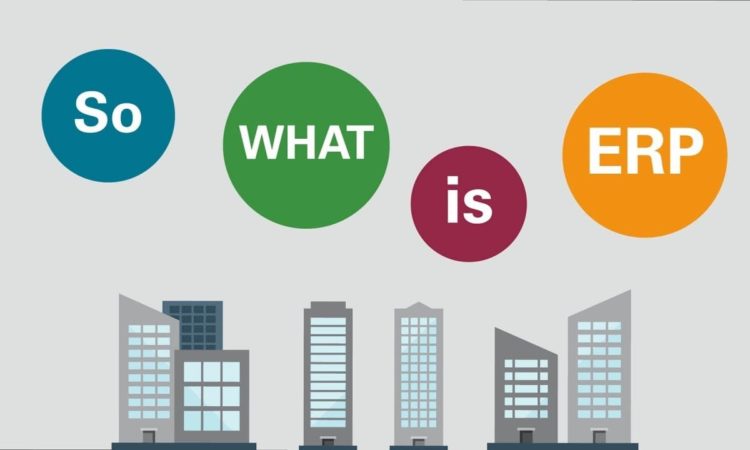An enterprise resource planning (ERP) system improves the speed and quality of conducting business processes across the entire organization. In an increasingly competitive global market, small to medium businesses (SMBs) need to stay current and lean without sacrificing quality. An ERP system helps SMBs achieve that goal.
For example, in a manufacturing organization there might be one piece of software for sales, one for inventory, one for order fulfillment, and one for quality control. The ERP system would have the sales software reference the inventory department to deduct one from the inventory counts and send a work order over to the order fulfillment center for every order that comes in. Upon completion of the order fulfillment, the ERP system notifies the quality control department. Without an ERP system, these things still happen but they are not automated, and the process is significantly slower and prone to human error.
Another example is an SMB in the insurance industry. When a claim comes in from an insured, the claim is processed, and the ERP system can trigger all appropriate actions in an instant, 24 hours a day, 7 days a week. The insured can get reimbursed within 24 hours, instead of 7 to 10 business days or longer. This is a win-win for businesses and consumers.
Distribution companies might implement a suite of software solutions that encompass financials, human resources, supply chain management, distribution process management, and retail and commerce.
The ERP system is connected to all the departments, management, staff, and equipment across the entire organization. This connection enables ease of reporting because all the data is in one central location, and it can be accessed by the business intelligence department.
Implementing an ERP System
An ERP solution is a suite of applications on any number of networks and operating systems with a central database repository. Companies have options on how to implement an ERP solution that is the best fit for their organization.
The first decision is whether to have your ERP system on-premises (on-prem) or in the cloud, or to develop your ERP system in-house with custom applications. The decision to write your own software is a big decision and not recommended unless perhaps for a small-enough organization.
On-prem software solutions require some investment in hardware, installation, and staff to maintain it. A cloud-based system has costs too, but you don’t have to worry about hardware or software installations of staffing. Cloud-based systems tend to be faster to implement as well. The downside to cloud-based systems is that you are at the mercy of the vendor you choose to implement the system. Regardless of whether you choose an on-prem or cloud-based ERP system, you will realize significant process improvements with your new system.
Before Implementing an ERP System
The organization should analyze all business processes and make process improvements before implementing the new ERP system. There is no benefit to implementing outdated and time-consuming processes. It is also important to ensure there is a dedicated project leader to champion the ERP implementation project.
Modular ERP
Each ERP software solution will contain basic enterprise functionality. However, each industry can have slightly different ERP modules that handle their specific back-office processes.
For manufacturing companies, ERP modules include managing:
- Financials
- Human resources
- Manufacturing
- Inventory
- Purchasing
- Quality
- Sales
For a distribution company, ERP modules include managing:
- Financials
- Human resources
- Supply chain
- Distribution process
- Retail
- Commerce
ERP for Vertical Industries
Organizations that fit within specific industry verticals or have niche business needs will require an ERP system that is suitable for their specific business needs. Examples of industry verticals include insurance, higher education, community organizations, professional services organizations, automotive, and oil & gas.
A vertical solution offers standard ERP functionality, along with integration of specific modules to provide industry-specific capabilities. For example, insurance companies follow strict industry regulations that need to be updated by specific effective dates. Solutions for insurance verticals should be aware of all insurance rules and regulations and updated accordingly.
It is common for vertical-orientated solutions to require a certain level of customization to meet the organization’s needs. During the implementation phase of the project. The vendor and client would map out the customizations that will be required to accommodate the customer’s specific business processes.
ERP systems for specific verticals yield cost savings as well as specific industry knowledge – and give you a marked industry advantage over generic ERP systems.
When Does your Business Need an ERP?
If your SMB organization is growing or you plan to grow your organization, yes, an ERP system will facilitate that growth. An ERP system is well worth the investment for SMBs, especially rapidly growing businesses that want to remain competitive. Implementing an ERP system will streamline your business processes, automate many tasks, improve quality, and enable fast and meaningful reporting that will help expose more areas for future improvements.
Other factors that demonstrate a need for an ERP system for your business include staff spending too much time patching and maintaining legacy systems, not being able to easily answer questions about business processes, and reporting taking longer due to a multitude of data sources needed. ERP systems are designed to address all these problems, and more.
P.S. Many thanks to Deeana Radley for providing this valuable material. Deeana is a business and technology writer at Technology Evaluation Centers with over 5 years of industry insight. She has written extensively on technology trends, software solutions and market developments, and particularly enjoys rendering complex topics accessible to beginners.





